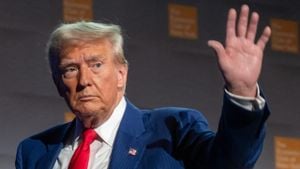The political scenario surrounding Donald Trump's potential return to the White House is raising eyebrows, particularly concerning its possible ramifications for the Ukraine-Russia conflict. With Trump’s promises of swiftly ending the two-and-a-half-year-long war, many are left to wonder whether these claims hold any weight or if they are just political rhetoric.
During the recent election campaign, Trump proclaimed he could cease hostilities “within 24 hours” if reelected. Yet, many are skeptical about the validity of these assertions and how he plans to achieve such results. Trump himself has described having "a very exacting plan on how to stop Ukraine and Russia," but has opted not to share the details.
Experts are querying the feasibility of any rapid resolution, especially with Russia still seeking to reclaim lost territories, like those recently captured by Ukrainian forces during cross-border operations. For the Kremlin, regaining control of these areas is of utmost priority, and Trump's vague promises may not offer the clarity or assurance needed for tangible diplomatic progress.
Public sentiment from Ukraine showcases apprehension as well. Many Ukrainians remain unsure of Trump’s intentions and fear he may demand territorial concessions as part of any peace negotiations. This prospect is particularly concerning for Ukraine, which continues to grapple with daily assaults from Russian forces. The stakes are high, and uncertainty looms large.
This tension is exacerbated by Trump's past approach to Ukraine. His administration previously withheld military aid, leveraging it to coax investigations against political opponents, which led to impeachment proceedings. This history understandably sows distrust among Ukrainian officials who now depend heavily on U.S. support. Since the invasion began, U.S. assistance has tallied up to $108 billion, making any reduction significantly detrimental to Ukraine's military and humanitarian efforts.
Despite these concerns, there exists some hope among Ukrainian leaders, as evidenced by President Volodymyr Zelenskyy’s reaction to Trump’s win. Although Zelenskyy has good reason to be wary, he pointed out the necessity of having strong allies, framing his conversation with Trump as "excellent," and expressing his endorsement for Trump's “peace through strength” philosophy.
Contrastingly, reactions from the Kremlin have been less celebratory. Dmitry Peskov, the Russian spokesperson stated, “Let’s not forget we’re talking about an unfriendly country directly involved in our conflict.” This stark statement emphasizes the complex and hostile dynamics still very much at play.
Political analysts speculate on the various outcomes of Trump’s presidency on the war. Some foresee Trump possibly freezing the conflict, allowing Russia to retain its territorial gains, which may be attractive to him politically as he seeks to reframe U.S. foreign policy under his administration without the burden of extensive military funding. The notion of halting funding altogether, as he has suggested, raises alarms for military strategists and Ukrainian officials alike.
The potential establishment of demilitarized zones proposed by Trump’s advisors also leaves room for interpretation. They insist, “We are not sending American men and women to uphold peace,” indicating instead reliance on European allies. This raises questions as to whether the European allies would bear the brunt of such commitments, especially when financial resources are already strained across the board.
With North Korean military assistance persisting for Russia, Kyiv’s situation is growing more precarious. Estimates suggest Russia has deployed between 8,000 to 12,000 North Korean troops to the front lines, complicity deepening against Ukraine’s backdrop of desperate defense.
Reactions on the ground from soldiers reflect palpable anxiety. One soldier, Maksym Sviezhentsev, articulated skepticism about Trump’s victory bringing positive change for Ukraine. “Trump is unpredictable,” he said, focusing instead on practical preparations for battle.
Such sentiments resonate deeply as many citizens express fear of being forced to concede occupied territories. Public sentiment is reflected through voices like Oksana Tsupii, who lamented, “It’s hard to observe the sacrifices made and think land concessions could be on the table.”
Compounding these anxieties are political predictions about whether Ukraine will remain steadfast against potential pressure from the U.S. administration. Analysts worry any hints at compromising national sovereignty could undermine public morale and resilience within the country.
While many backers of Ukraine are concerned about the financial and military aid projected under Trump, previous experiences during his first term have already set the stage for skepticism from Ukrainian policymakers. The historical reluctance from Trump to criticize Putin’s regime raises fears of repeating prior dynamics where support would be contingent upon political alignments.
This crossroads positions Ukraine at the mercy of U.S. politics as they brace for possible shifts. Whether Trump finally delivers on his promises or leanings will likely dictate the future stability of Ukraine during his administration. The stakes are not only high for Ukraine and its people but for the entire geopolitical balance amid the ever-evolving challenges they face.
For Putin, the possibility of negotiating with Trump may yield gains, as the Russian president has long sought ways to alleviate sanctions and so-called isolations imposed by the West. Observationally, much of what plays out during Trump’s presidency could result from negotiations reflecting those of which international boundaries have been tested.
Trump's capacity to forge any semblance of peace will remain highly contingent on compliance from all sides involved—far from straightforward considering the longstanding legacy of distrust, warfare, and desperation for sovereignty. The future of Ukraine, intertwined with Trump’s decisions and aspirations, leaves many wondering how the interplay of diplomacy will evolve under these unpredictable circumstances.



